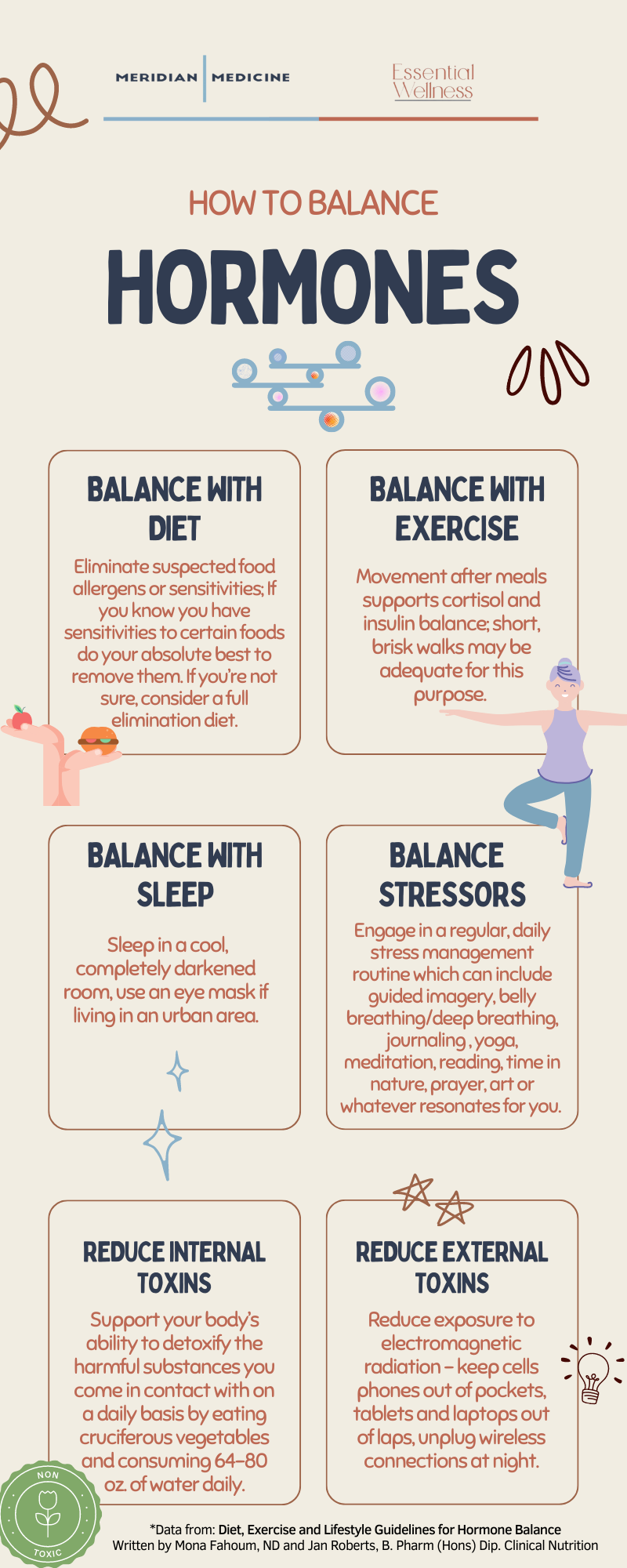Diet, Exercise, and Lifestyle Guidelines for Hormone Balance
Written by Mona Fahoum, ND and Jan Roberts, B. Pharm (Hons) Dip. Clinical Nutrition
Download for Printable Hormone Guide PDF.
Dietary Tips
Begin the day with 1 teaspoon of “Sole” therapy solution in 8 ounces of pure, clean water. This will aid in cellular hydration, mineral replacement, and electrolyte balance. Go to Sole for more information and instructions.
Eliminate suspected food allergens/sensitivities; If you know you have sensitivities to certain foods do your absolute best to remove them. If you’re not sure, consider a full elimination diet to find out what may not agree with your system or, alternatively, do a trial elimination (3-4 weeks) of gluten, dairy (lactose and casein), and sugar to see how hormones, mood, and energy are affected.
A “Paleo/Mediterranean” style food plan is favorable for hormones, weight management, and other health concerns. Some features of this food plan include:
Choose organic vegetables whenever possible – Use the ‘Dirty Dozen/Clean 15’ as a guide.
If meat is eaten, choose grass-fed, free of hormones and antibiotics.
Choose wild-caught fish over farm-raised fish.
Whole grains can be measured in bites if restriction is difficult. 7-10 bites per meal for most; some can tolerate more while others cannot tolerate grains. It is ideal to choose gluten-free grains if you do consume grains.
Consume plenty of cruciferous vegetables daily. This includes broccoli, cauliflower, Brussels sprouts, cabbages, kale, and others. These vegetables aid in your body’s detoxification process, which is very important in managing hormones as well as reducing the toxic exposure we all face in today’s world.
Consume healthy fats and oils such as olive oil, coconut oil, olives, and avocados. Your body needs fat (and protein) to make hormones. Healthy fats are also integral to weight loss/ management.
Avoid or reduce processed foods, saturated fats, sugar, alcohol, caffeine, and animal dairy products
Drink 64-80 oz. of purified water every day. Invest in a quality filter and avoid bottled water, specifically plastic bottles.
Replenish nutrients (that may be insufficient or deficient) through food or supplementation.
Ensure adequate Vitamin D status. Get appropriate unprotected sun exposure whenever possible or supplement with vitamin D as needed.
Exercise
Movement after meals supports cortisol and insulin balance; short, brisk walks may be adequate for this purpose.
High-intensity, interval training (HIIT) supports the balance of insulin and cortisol in the body even after the workout is over. The resistance aspect, even if just using body weight, maintain, and may increase, muscle mass and bone health. Muscle-building/strength-building exercises are a way to switch your metabolism into a higher gear.
Cardiovascular activity is also helpful and can be utilized using high-intensity, interval training as compared to long, slow distances. Many people do more cardio than needed, 20-40 minutes is often enough to support the metabolism and heart.
4-7 sessions per week are recommended and often necessary to regain hormone balance. Make sure you find activities you enjoy, instead of dread, and switch it up every few months to make it more exciting and beneficial.
Improve flexibility by stretching for 5-10 minutes daily.
Stress Management
Re-engage with yourself and your hormones. They are a part of our being and in many ways help shape who we are – despite the upheavals, they give us life, have the ability to make and sustain a life and help us thrive in life. Balance, by definition, is the middle of too much and too little – and the fluctuation of our hormones is what makes life go around. Strive for balance, but recognize the power you hold at certain times of your cycle (like more energy right before ovulation) and when your body needs a rest (like the fatigue at menses onset). Or, if menopausal, the power you now hold as a matriarch and wise woman.
Engage in a regular, daily stress management routine which can include guided imagery, belly breathing/deep breathing, journaling (i.e. gratitude journal), yoga, meditation, reading, time in nature, prayer, art, or whatever resonates for you. While you may not be able to delete stress from your life, the way in which you deal with the stress can be changed.
Massage or physical touch is a key factor for maintaining hormonal health. Oxytocin, which stimulates growth hormone, is released during orgasm, labor, and breastfeeding, but also through safe touch, like massage. Additionally, and if desired, sexual activity is important and data suggests that men and women benefit from physical, sexual intimacy at least once per week for healthy hormone levels.
Sleep
Most people feel best with 7-8 hours of sleep each night. Poor sleep patterns interfere with hormone balance and add to the retention and gaining of weight so sleep hygiene is very important. Sleep in a cool, completely darkened room, and use an eye mask if living in an urban area.
Screens emit blue light that reduces our natural production of melatonin (our sleep hormone). Disconnect from electronic devices 1-2 hours before your desired bedtime, or at least get some blue light-blocking glasses to wear at night.
Regular exercise can promote better sleep.
Understand your sleep patterns and what additional support may be beneficial. Reach out to your provider or our medical team if some of these sound like you:
Trouble falling asleep and staying asleep?
Waking between 2-4 am each morning and can’t get back to sleep?
A racing mind inhibits your ability to fall asleep?
Hot flashes or night sweats are disrupting your sleep?
Decrease your toxic load - inside and out
Good gut health supports detoxification, weight management, hormone balance, and mental and emotional well-being. Seek care to see if probiotics, digestive support, or other care is warranted if you feel you have digestive issues.
Have at least one bowel movement daily. If needed, use supplemental support to help with this. Increasing water and fiber intake is the best place to start. Seek care if more support is needed.
Support your body’s ability to detoxify the harmful substances you come in contact with on a daily basis by eating cruciferous vegetables and consuming 64-80 oz. of water daily.
Use glass, ceramic, or stainless-steel containers to store and heat food. Minimize plastics in your life and in your home.
Choose personal products (makeup, hair products, lotions, toothpaste, etc.) and cleaning products that are free of harmful toxins and fragrances. Consult the EWG for resources and to check your products for toxins.
Keep plants in your home and office to clean your air naturally.
Reduce exposure to electromagnetic radiation – keep cell phones out of pocket, tablets and laptops out of laps, and unplug wireless connections at night.


